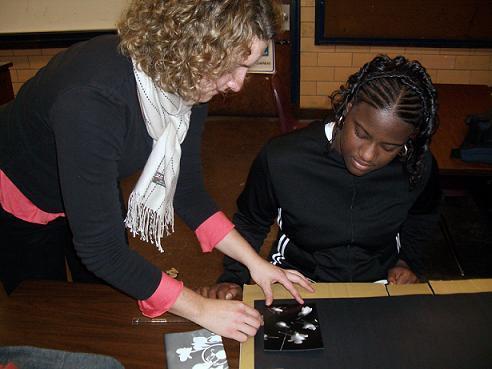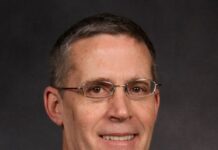
Last year, when Ray M. Di Pasquale was inaugurated as president of the Community College of Rhode Island, the school wanted to celebrate with a state-wide community service day.
So CCRI administrators contacted Rhode Island Campus Compact, a collective of 11 state higher education institutions that trains and connects Rhode Island’s higher education staff.
The result for CCRI was a successful day of community projects – so successful in fact that in March the school will participate in a week’s worth of projects. And Campus Compact is again playing a key role in coordinating those plans, said Becky Yount, dean of student life at CCRI.
The Rhode Island Campus Compact – one of 32 state chapters nationwide, representing more than 1,100 institutions – is an advisory committee of sorts for the institutions that are members. The national organization was founded in 1985 by Howard Swearer, then Brown University’s president, in 1985, and is still based on the Brown campus.
Roger Mandle, Rhode Island School of Design president and chairman of the Compact, said practical experience and real-life opportunities gained from community service programs are a needed component of professional knowledge – and Campus Compact, although its role is removed from the actual service, is an integral part of the process.
“We train the people who train the students,” he said. “And not only train them, but we keep them in contact with each other.”
Several of the Rhode Island colleges also have programs funded by the Feinstein Foundation, founded by Alan Shawn Feinstein in 1991, on the condition that community outreach and service be mandatory components of the curriculum. For those individual programs, Campus Compact works as a guiding force – supplying teaching, coordinating and sometimes financial support.
“There are many different models of what civic engagement and community service look like across higher education institutions in the state,” said Perri Leviss, executive director of Rhode Island Campus Compact.
“Some schools even have mandatory service requirements in the form of service learning courses. Others require students to perform a certain number of service hours in the community prior to graduation.”
At Providence College’s Feinstein Institute for Public Service, students since 1994 have been able to study community service as a major – the first such program in the United States – and, in the past two years, the institute has broadened its offerings, covering different areas of concentration within the broad topic of public service.
“We were the first major in public and community service studies in the United States,” said Raymond Sickinger, the institute’s director and a professor of history. “And, to the best of my knowledge, we’re the first interdisciplinary department of public and community service studies in the United States.”
During the 2006-07 school year, a total of 2,240 PC students completed 45,260 hours of community service – including about 285 students who did it as part of college courses.
At Roger Williams University, home to another Feinstein Center, coordinator K.C. Ferrara said students last year completed 34,846 hours of service.
“I think the most important thing [about the Campus Compact] that they do is plug us into the national picture of what’s happening with service,” said Ferrara. For training and service work, Campus Compact also has helped RWU secure national grants. “And they plug us into national resources.”
At the University of Rhode Island, the mandatory freshman course “URI 101” requires that students complete service projects, and the faculty members who oversee those projects – led by URI’s own Feinstein Center for Service Learning – are trained by the Campus Compact.
“For example, we have a workshop coming up in early November that’s geared toward helping faculty that have service learning within their classes,” said center coordinator Sarah Miller. “They can go meet with other faculty or other experts and talk about their experiences. That’s the type of opportunity that Rhode Island Campus Compact offers.”
Thom Wylie, senior vice president and provost at New England Institute of Technology, said students there are exposed to the Feinstein Enriching America program – requiring each to undertake a 15-hour project. Last year, 583 students completed 13,580 hours of service.
“This is something that is now embedded in the [NEIT] community, and it’s been absolutely terrific,” he said.
Arlene Potvin, the program coordinator at NEIT, said much of that participation is in the Cell Phones for Soldiers recycling program – which so far has collected about 1,084 phones – and annual food drives, for which students have donated about 937 pounds of food since 2002.
Johnson & Wales University also has a Feinstein Community Service Center. Providence Campus President Irving Schneider, a Campus Compact board member, said all students, as a graduation requirement, have to complete 12 to 20 hours of service. Much of that work is done within their field of study – such as culinary students teaching elementary students about nutrition.
Part of the Campus Compact’s strength, said Leviss, comes from the makeup of its board.
“Our board is made up of college presidents, and that’s unusual for any organization. Usually in these types of nonprofits, it’s not the most senior member of any organization” who serves, he said. “It is a presidential organization, so when it comes down to it, the votes on the budget happen by the presidents of multiple organizations.”
And for the students, Leviss said, the Campus Compact provides valuable hands-on learning.
“Instead of going out and spending a week partying in Daytona Beach, student go down to New Orleans and spend a week doing clean up from the hurricane,” Leviss said. “So it’s experiential work that happens outside the classroom.” •












